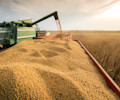Simon Jessop, 26 September 2016
A group of 40 investors managing $1.25 trillion in assets have launched a campaign to encourage 16 global food companies to change the way they source protein for their products to help to reduce environmental and health risks.
The investors, which include the fund arm of insurer Aviva and several Swedish state pension funds, wrote to the food companies on Sept. 23 urging them to respond to the “material” risks of industrial farming and to diversify into plant-based sources of protein.
Among the companies targeted were Kraft Heinz, Nestle, Unilever, Tesco and Walmart, a statement by the Farm Animal Investment Risk & Return Initiative, which organised the investor group, said on Monday.
“The world’s over reliance on factory farmed livestock to feed the growing global demand for protein is a recipe for a financial, social and environmental crisis,” said Jeremy Coller, founder of the FAIRR initiative and chief investment officer at private equity company Coller Capital.
Pollution from intensive livestock production is already at too high a level, while safety and welfare standards are too low and the industry cannot cope with the projected increase in global protein demand, Coller said.
“Investors want to know if major food companies have a strategy to avoid this protein bubble and to profit from a plant-based protein market set to grow by 8.4 percent annually over the next five years,” Coller said.
The campaign follows an Oxford University study which said $1.5 trillion in healthcare and climate change-related costs could be saved by 2050 if people reduced their reliance on meat in their diet.
The study also pointed to growing political pressure on companies to change, citing a consultation in Denmark on the introduction of a red meat tax and a Chinese government plan to reduce its citizens’ meat consumption by 50 percent, FAIRR said.
Ella McKinley, ethics analyst at Australian Ethical Investment, which is taking part in the campaign, said the need to change food production models was essential to help to limit climate change.
“Forward-looking companies can move now to encourage more sustainable diets by reducing reliance on meat and growing the market for plant-based protein alternatives. In the process, companies make their own protein supply chains more resilient to future shocks,” she said.
The other companies written to by FAIRR were General Mills, Mondelez International, Ahold-Delhaize, The Co-operative Group, Costco Wholesale Corporation, Kroger Company, Marks & Spencer, Wm Morrison Supermarkets, Ocado, Sainsbury’s and Whole Foods Market.
A Nestle spokeswoman said the company did not use much meat, “so our main strategy is not to focus on replacing the meat that we do use as its impact would be minimal. Our main opportunities lie in innovating new products using alternate proteins”.
“In terms of timetables and targets, this is still a relatively new area, where in many countries the consumers are not fully prepared to replace or reduce meat in their diets. Our focus is to innovate great tasting solutions to encourage consumers to try them and over time make small, sustainable shifts towards a higher plant-based, more balanced diet.”
Kraft Heinz declined to comment when contacted by Reuters. The Co-Op said it had yet to receive the letter. Mondelez also declined to comment because it had not yet seen the letter, while a Sainsbury’s spokesperson said: “We’re aware of the issue and are looking forward to receiving a copy of the letter.”
A Walmart spokesman said the company was not familiar with the campaign and so could not provide comment, while a Kroger spokesman said the firm had not received the letter but was happy to talk with the investor group.
The remaining companies were not immediately available to comment.
Among the other investors to join the campaign were Nordea Asset Management, the fund arm of Norwegian lender Nordea, Boston Common Asset Management, and Impax Asset Management, as well as a number of charities and other ethical investors.
(Additional reporting by Martinne Geller, James Davey and Siddarth Cavale. Editing by Jane Merriman and Louise Heavens)











